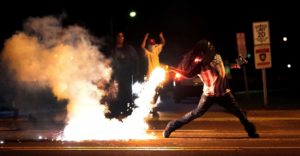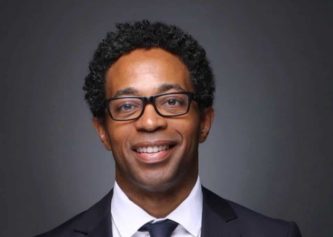
Headlines are everything in journalism, they draw traffic, but content is important, as well. Complex reviewed Huffington Post’s Ferguson piece boasting its finesse at pointing to the fact that we are finally having the “conversation” about criminal justice and racial disparities.
Who is “we?”
African-Americans have BEEN talking about police brutality. One just has to watch the footage from Selma, Alabama, marchers being attacked while peacefully attempting to cross the Edmund Pettus Bridge to the Rodney King beating to Michael Brown to get an idea of just how long. What Complex credits the Huffington Post for drawing attention to, however, is a moot point to African-Americans because our everyday discourse is about how we are impacted by the “in-justice” or “just us” system that supports brutality against us. The only difference we see is that it has now become a mainstream talking point and “Black Lives Matter” is becoming part of the issue’s vernacular.
What is striking about this in-depth piece is how far the Huffington Post reaches in trying to connect issues and events to Ferguson as proof that the people of Ferguson are somehow better off and lives have miraculously changed because these singular events took place after the fact. Specifically, one has to analyze and challenge the seven key examples the Huffington Post piece gives and how they missed the mark and the impact on Ferguson residents:
‘Missouri Overhauled Its Municipal Courts…’
Despite 40 state-issued measures to improve policing, even the Huffington Post agrees that in Ferguson these measures are temporary. New judicial appointments as well as the appointments of African-Americans to the positions of police chief and city manager are all interim with no foreseen permanency. How does HuffPo justify this as substantive change? Interim appointments leave the residents of Ferguson under the impression that as soon as “Black Lives Matter” is no longer news and we “just get over it,” things will resort to the way they were and there will be more Michael Browns and possible retaliation from the very people sworn to protect and serve. Moreover, 16,000 people still have outstanding warrants in Ferguson that amount to exorbitant fees and fines; for people with little economic means, this is a financial hardship. The number of people with these warrants is equal to nearly 75 percent of Ferguson’s population and additional 2,300 warrants were issued this year.
While the FBI admitted that there were unfair and racist practices within in the Ferguson Police Department, the death of Michael Brown and numerous others since still haven’t resulted in a definitive method for collecting data on the number of civilian deaths at the hands of police; this is despite an order commissioned by President Barack Obama for the FBI, CDC and Bureau of Justice Statistics (BJS) to create one. The BJS had been using a data reporting system, the Arrest-Related Deaths program (ARD), to “to capture all circumstances associated with the actions or events that occurred during an attempt by law enforcement to detain an individual.” The ARD was designed to comply with the Death in Custody Reporting Act of 2000. They conducted assessments quarterly and collected data from all 50 states, but an internal assessment of the validity and reliability of the ARD data demonstrated potential problems with the methodology being used for collection. Essentially, the BJS determined they were not getting accurate numbers and suspended the use of the ARB in March 2014.
Brown’s death and the protests in Ferguson occurred in August 2014. To date, a vast number of similar civilians have been killed at the hands of law enforcement, and too many have made national headlines. The problem is capturing the real numbers of those who don’t. HuffPo did not highlight how this one particular failure in government failed Ferguson. The reason protests began is because the people were demanding information about the officer involved and the circumstances that led up to Brown’s death. In the year that has passed, Ferguson’s people have watched Black bodies pile up across the country. They are still waiting for answers as are we all.
‘News Media Added Nuance to the Coverage of Police Violence Against Blacks…’
Even the Huffington Post was guilty in its initial portrayal of African-Americans in Ferguson as the perpetrators of violence — all mainstream media were. Photographs and videos of young Black males in sagging pants, carrying cases of beer out of a corner store on fire were in abundance. If it weren’t for Black media outlets offering a different narrative, where police and National Guard in riot gear were throwing tear gas into groups of peaceful protesters, the mainstream media would not have been forced to include these images. Assuming that African-Americans protesting would automatically drive news outlets to put a positive spin on the plight of Black people without having their conscience pulled into doing so is to have false hope. The media did what it always does to their shame: when even the idea of Black people congregating for a cause is considered, it plays on the inevitable fears of white people.
The Ferguson protests were, for the most part, peaceful. When tensions did run high, it was not without provocation. For police to show up to a peaceful protest in riot gear and for civilian-activists to see military-style tanks and armor aimed in their direction will stir up distress and frustration in anyone who only wants their concerns heard. It took a select few reporters to draw attention to these things. And I wonder … how many others would have actually shown up had there not been a fairly heavy celebrity presence there?
‘Approval of Funding for Body Cameras…’
Like the HuffPo article says, Congress did not even move to pass this bill until AFTER Baltimore, despite the fact that it was proposed in December. Obama’s original proposal called for $263 million to improve community policing tactics and $75 million toward funding body cameras. While this wasn’t an end-all in eradicating the systemic issues within law enforcement, it was a good proposal to start that, if fully funded, would have had a substantial impact on the Ferguson community directly. Congress only approved $20 million to fund body cameras, and even with that approved funding, it was left up to the governors of each state to decide whether to participate in the program. There was no universal legislation to mandate all civilian-police interactions be subject to recording. Further, the improvements to community policing never even got off the floor.
The larger issue here, also, is how the community policing tactics would improve with training on diversity and recruitment of people of color to police their own communities. As we saw recently in Cleveland, even with a body camera footage as evidence, police officers will shoot without cause and lie to get out of it, but trained officers who are invested in the communities they serve, respect and look like the people, and seek to resolve conflicts peacefully would be an asset to Fergusons across America. This is critical, but HuffPo only pointed to the two temporary, interim appointments in Ferguson as evidence that change has come. This is not change when those policing the communities are still the same officers who were there before Brown was killed, the same ones who the FBI found were practicing unfair, racially biased tactics.
‘#TakeItDown Sowed the Speed of Success…’
I lived in South Carolina and worked for the state, so I can speak with some degree of authority to the point that the flag has remained a hot-button political issue for a long time. Each session, the Legislative Black Caucus has presented a bill to take down the flag, and each session it was either tabled for debate or held in committee. Whether Ferguson happened or not, the speed with which the flag came down was all due to the massacre in Charleston and the fact that South Carolina state Sen. Clementa Pinckney was one of the victims. Pinckney was an advocate for bringing down the flag for years; it was one of the first bills he presented in the Legislature when he was first elected. His commitment to the people of Charleston and South Carolina and the fact that he and the other victims in this tragedy were shot in their place of worship drove the #TakeItDown movement. This was on a more elemental level to me with the #LoveWins movement following the Sandy Hook Elementary School shooting and the impact of this magnitude of a tragedy. Removing a flag is easy, but erasing an entire system built on the oppression of darker people, not so much.
This was yet another missed opportunity for making a punitive point by HuffPo. Let’s be clear. It is a bit trite to minimize an action meant to honor the lives of nine people who were targeted because of their race by saying it was Ferguson that made it happen; that doesn’t honor Brown or the people of Ferguson, either.
Pinckney was outspoken about police brutality following the shooting of Walter Scott taking place in his district. If evoking the Charleston tragedy in its relationship to the Ferguson anniversary, why not just use his own words? As he stood before the state Senate in appeal to his fellow lawmakers, Pinckney had this to say about seeing a Michael Brown-like killing in his backyard of Charleston:
“When we first heard on the television, that a police officer had gunned down an unarmed African-American in North Charleston by the name of Walter Scott, there were some who said, ‘Wow. The national story has come home to South Carolina.’ But there were many who said, ‘There is no way that a police officer would ever shoot somebody in the back 6, 7, 8, times.’ But like Thomas (biblical reference), when we were able to see the video, and we were able to see the gun shots, and when we saw him fall to the ground, and when we saw the police officer come and handcuff him on the ground, without even trying to resuscitate him, without even seeing if he was really alive, without calling an ambulance, without calling for help, and to see him die face down in the ground as if he were gunned down like game, I believe we all were like Thomas, and said, ‘I believe.’”
‘The Fight for Wage Equality Gained Steam…’
The “Raise the Wage” campaign could not have even predicted a Ferguson at its inception. In the 2014 State of the Union Address, Obama was very clear in calling for Congress to raise the national minimum wage from $7.25 to $10.10 per hour. This campaign was well underway and states already had bills on the table to examine wage increases in their respective legislative sessions in 2014. To suggest that Ferguson made this an agenda item would mean that there was a benefit to the Ferguson community and there was, at least, a movement toward prosperity and economic growth spurned by the state of Missouri signing such a bill into law. That was never the case. The Huffington Post piece does not explicitly suggest that it was, but rather says the discussion was starting to “gain steam.” It did, not in Missouri (on the state level) and not in Ferguson (on the municipal level). But it did in Kansas City, which HuffPo failed to mention.
While the call for economic equality has always been part of the civil rights agenda for African-Americans, the fact remains that Missouri’s minimum wage is $7.65 an hour and Missouri did not and prevents cities from raising their minimum wage independently. Defying this law, only Kansas City — not Ferguson — raised its minimum wage to $8.30 an hour, which goes into effect this month, and to $13 by 2020. Still, Kansas City is over three hours away from Ferguson and not a feasible commute for Ferguson jobseekers. As a result, Ferguson residents are still living in the same poverty they found themselves in a year ago.
‘Wealth Gap Became a Democratic Campaign Issue…’
The wealth gap? Really? Completely overlooking the fact that the Black Lives Matter movement, which grew out of Ferguson, has made racial oppression and violence against Blacks a Democratic campaign issue, the HuffPo article instead turns this discussion at the Netroots Nation Convention into a wage gap crisis issue. Interestingly enough, several Huffington Post articles stated that Black activists had been criticizing Bernie Sanders since Netroots for making the same statements they did in reducing racism to a problem that can be solved invariably by addressing wealth inequities. It can’t. Even though they are interconnected, structural racism and poverty are separate issues; the solutions for one will not erase the society of the other.
‘Obama Has Embraced Honest Conversations about Race…’
HuffPo is crawling with columnists who know there is no more honest a president than a lame duck one. Like Obama has said, himself, “I have no more campaigns to run.” Ferguson didn’t make Obama “more honest” or give him the freedom from political scrutiny as a potential political candidate has. Obama’s remarks about the killing of Brown were carefully scripted to simultaneously address the tragedy and calm white fear:
“The death of Michael Brown is heartbreaking, and Michelle and I send our deepest condolences to his family and his community at this very difficult time. As Attorney General [Eric] Holder has indicated, the Department of Justice is investigating the situation along with local officials, and they will continue to direct resources to the case as needed. I know the events of the past few days have prompted strong passions, but as details unfold, I urge everyone in Ferguson, Missouri, and across the country, to remember this young man through reflection and understanding. We should comfort each other and talk with one another in a way that heals, not in a way that wounds. Along with our prayers, that’s what Michael and his family, and our broader American community, deserves”
His comments were cautious in tone, but reassuring, yet Ferguson residents didn’t get a visit from Obama until December, four months after Brown was killed and events unfolded. To many, it was too little too late, a presidential afterthought akin to President George W. Bush flying over New Orleans after Hurricane Katrina, but never visiting the Superdome to witness the horror people lived in for days. Obama speaks of race in general, but still has yet to just stand in an open forum and speak their names, all of them, or to say unequivocally that “Black lives matter,” as have the rest of us. The people of Ferguson really needed Obama to show up for them and that means being a little less presidential and a little more human here.
The success of the movement in Ferguson cannot be measured in just one year, nor will the successes be seen in a series of unrelated events that are all bound together by the fact that they disproportionately affect African-Americans. The issues are far too complicated for either of those. However, a single truth remains that Ferguson is and was mostly about people. Nearly 50 groups and coalitions are working together to bring about change that will directly impact the people of Ferguson and provide lasting, sustainable change. Hosts of new activists are emerging like Nabeehah Azeez, who founded Missourians Organizing for Reform and Empowerment (M.O.R.E.). Regular, everyday Ferguson residents are taking to their smartphones and keeping record of police interactions they see. This is what the Huffington Post article did not offer as proof that Ferguson’s revolt was a success. What is clearly the most important thing to come from the tragedy of Michael Brown’s death and Ferguson is that as African-Americans, we are no longer apathetic to our own situation. We’re awake and we intend to stay that way.


